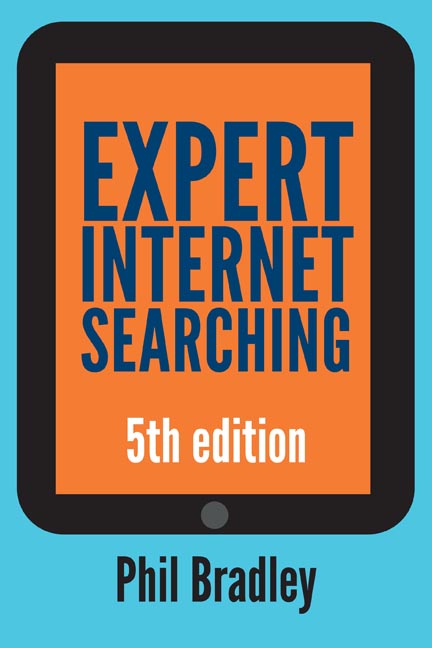Book contents
- Frontmatter
- Contents
- List of figures
- Preface
- Acknowledgements
- 1 An introduction to the internet
- 2 An introduction to search engines
- 3 The world according to Google
- 4 Other free-text search engines
- 5 Directory, clustering and similarity search engines
- 6 Multi- and meta-search engines
- 7 Social media search engines
- 8 Visual and image search engines
- 9 People-based resources
- 10 News-based search engines
- 11 Multimedia search engines
- 12 Specialised search engines
- 13 Hints, tips and the future
- Index
10 - News-based search engines
Published online by Cambridge University Press: 09 June 2018
- Frontmatter
- Contents
- List of figures
- Preface
- Acknowledgements
- 1 An introduction to the internet
- 2 An introduction to search engines
- 3 The world according to Google
- 4 Other free-text search engines
- 5 Directory, clustering and similarity search engines
- 6 Multi- and meta-search engines
- 7 Social media search engines
- 8 Visual and image search engines
- 9 People-based resources
- 10 News-based search engines
- 11 Multimedia search engines
- 12 Specialised search engines
- 13 Hints, tips and the future
- Index
Summary
Introduction
There are several questions that arise when looking at the concept of news search. First, what exactly does news mean now? Global and national news is a fairly clear concept, and we can take that down to the next level of local news. However, is it ‘news’ that your next door neighbour has painted their fence? To you it may well be very interesting and valuable to know what product they used and how effective it is, because you can then go and buy some paint yourself from the same manufacturer if you have been shamed into painting your fence, too. However, your friend at the other end of the country may well not regard this as news at all, though if you paint your fence, it may be – so we could perhaps define ‘news’ as being fresh information that is of particular interest to us and our friends and colleagues.
Given the ease of use of social media-based tools where we can share updates so easily it is perhaps understandable that people will view the concept of ‘news’ in a very different way now than they did prior to this ease of access. Indeed, with cameras – both still and video – in most people's pockets in the form of their smartphones, everyone can suddenly become a journalist, and it's quite usual these days to see video footage appear on news channels which started off in a smartphone, or images in newspapers that have been taken (sometimes with, sometimes without, permission) from Flickr and other photograph-sharing websites. Tools such as Periscope, at www.periscope.tv, allow you, in its own words to ‘explore what the world is seeing’. I visited the website and I was able to see live streaming of a person showing me the traffic passing an intersection in New York City, the sunrise in California and a musician singing in a bar in Dublin. I could also follow along with the speeches at the Scottish Nationalist Party Spring Conference, learn how to bake cream cheese tarts and watch a protest in respect of immigration rights. All of this is news to some, of mild interest to others and boring to yet another group!
- Type
- Chapter
- Information
- Expert Internet Searching , pp. 157 - 176Publisher: FacetPrint publication year: 2017



